









































Anew wave of comedians is redefining humour in Nigeria. As such, the comedy scene is experiencing a transition, and these comedians are taking advantage of social media platforms to promote their work. In addition to being standup comedians, these emerging talents are creating skits that address social and everyday issues with a certain twist. These new-age comedians have become household names with audiences across the globe via social media. They are also proof that creativity plus digital innovation equals a successful career. These new comedians mark an era of change in the industry as they have redefined comedy. From “Real Warri Pikin” to “Taaoma”, read about the new-age comedians on pages 8 to 10.
Discover the world of hair accessories, a versatile and creative way to elevate your style for various occasions. From bun covers to hair clips, these accessories come in various sizes and styles, catering to your unique needs. Scroll to pages 4 and 5 to explore the many hair accessories and when to use them.
Our skin is most active in the morning, making it crucial to prepare it for the day’s activities. Antioxidants are our best allies in reducing damage caused by sun exposure, pollution, and stress. The beauty page delves into some significant skincare mistakes to avoid in our morning routine, empowering you to make the best choices for your skin. Find this on page 12.
Our food page, Bon Appetit, shows different ways to incorporate yoghurt into our meals. See page 11.
You can now download the magazine by scanning the QR code on the cover. Don’t forget that you can also download our playlist by clicking on the instructions below the QR code on page 16.
Until next week, enjoy your read.





SUNDAY, JUNE 23, 2024 THEWILL NEWSPAPER • www.thewillnews.com






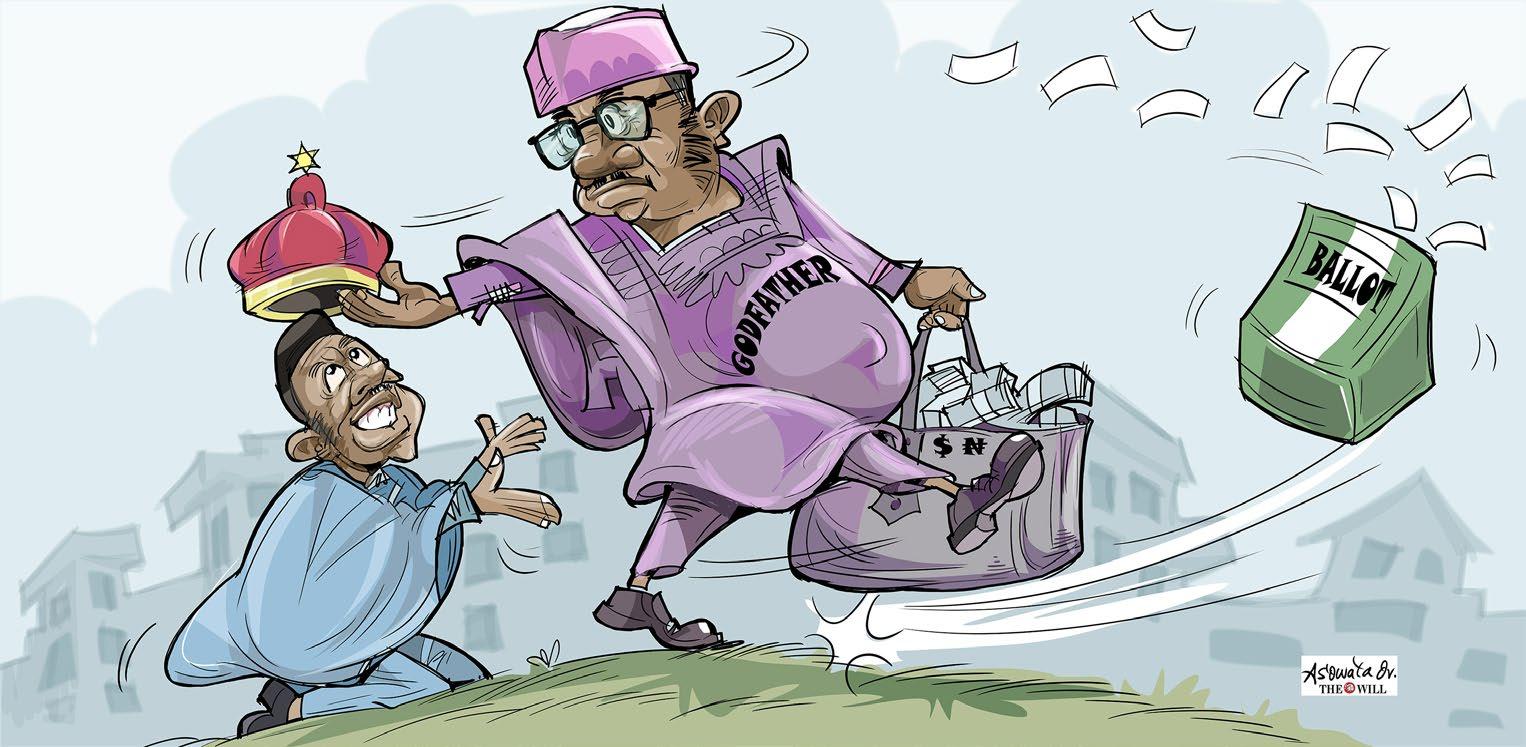
Tomorrow, Monday June 24, 2024, the State High Court in Kano will either raise or douse by its ruling, the tension that has been building to breaking point since a Federal High Court in the state presided over by Justice A. M Liman nullified all steps taken by the Kano State Government, sequel to the Kano Emirate (Repeal) Law of 2024, which reinstated Muhammadu Sanusi 11 as the 16th Emir.
On that day, the government, which had failed to get the Commissioner of Police, AIG, Usaini Gumel to carry out its order to evict deposed 15th Emir of Kano, Aminu Ado Bayero from his Nasarawa palace ahead of a scheduled demolition, renovation and reconstruction, will know its fate on the eviction order for which it filed a case in the court.
In the meantime, the government had since raised the ante following the ambiguity in what Constitutional lawyer, Professor Auwalu Yadudu, described as a “muddled up” judgement delivered by Justice Liman, who in what seemed like a doublespeak, said, “I hereby order that every step taken by the defendant in pursuant of the Kano State Emirate Council Law is hereby annulled and set aside.”
But Liman added: “However, this does not affect the validity of the law, which is the subject matter, and I refuse the prayer by the applicant to nullify the law.”
The state government at the weekend immobilised Bayero’s Nasarawa palace with a security ring, pending tomorrow’s judgement. Yet Bayero, like Sanusi continued their rivalry on Friday when both held separate Jumat Prayers on Friday.
Elsewhere in the country, the court holds the ace to dousing the prolonged tension that boiled over last week when partisan youths demanded an end to the tenure of elected local government chairmen in Rivers State.
In the ensuing confusion, which had its background in the long-drawn supremacy battle between Governor Siminalayi Fubara and his predecessor, Nyesom Wike, Minister of Federal Capital Territory, Abuja, a Police Inspector and a member of the local vigilante were killed, forcing the police to mount guard at the council secretariats until the court made a pronouncement on the tenure of the local government council Chairmen.
Meanwhile Fubara has gone ahead to appoint Caretaker Committee chairpersons to replace the forcefully ejected chairmen.
The pending court case is between Martin Amaewhule and 24 others against Victor Oko-Jumbo and others, which the Court of Appeal sitting in Port Harcourt, Rivers State capital, last Thursday reserved judgement till July 4, 2024, and directed the parties involved in the matter to maintain status quo.
The three-man panel, comprising Justice Jimi Olukayode Bada, Justice Hama Barka and Justice Balkisu Aliyu, made this decision during its virtual sitting on appeal number CA/ PHC/198/2024.
Amaewhule and 24 others are challenging the interlocutory injunction of Justice Charles Wali of a State High Court
in Port Harcourt, which validated the declaration of their seats in the state House of Assembly vacant, pending the determination of the suit before it.
In the same week, youths in Kaduna State under the auspices of Kaduna Citizens Watch for Good Governance and Kaduna Accountability Network stormed the Government House in Kaduna and called on security agencies to arrest former Governor Nasir el-Rufai and for Governor Uba Sani to officially forward to the Economic and Financial Crimes Commission, EFCC, the Assembly’s Ad-hoc Committee report indicting the former governor of alleged N423 billion official graft.
“What we are witnessing in these three big states in the country, Kano State, Rivers State and Kaduna State, is a very serious threat to democratic governance, but we have not seen it yet. It will continue because we have made institutions weak and individuals stronger. So, the institutions are at the mercy of individual politicians who are at the helm of affairs in the country. The Western man who is giving us grants to strengthen our institutions has more problems than us, but the institutions over there are stronger,” the National Chairman of Inter-Party Advisory Council, IPAC, Alhaji Yusuf Dantalle, told THEWILL on Friday.
SIMILARITY IN PREVAILING SITUATION
In Kano, Rivers and Kaduna, the same political undercurrents prevail. The first is godfatherism and the second, which is linked to the first, is the politics of 2027.


Wike whom Governor Fubara anointed and installed in office fell out with his godson whom he accused of tampering with his political structure in Rivers State, a euphemism for sabotage of his future political ambition.
Wike was a presidential aspirant on the platform of the Peoples Democratic Party, PDP, in the last general election. Although he lost in the party’s primary election, he has not stopped nursing the ambition to rule the country.
In Kaduna, former Governor Nasir el-Rufai’s dispute with his successor, Governor Sani, whose political fortune he helped to nurture from the Senate to governorship, started when Sani pledged his full loyalty to President Bola Tinubu and chose to chart his own, inclusive administrative style, in stark contrast to the past at a time el-Rufai was having ministerial nomination blues at the centre, thus fueling mutual suspicion between them.
El-Rufai is widely reported to be nursing a presidential ambition in 2027 and his recent highly publicised visit to the leadership of the Social Democratic Party, SDP raised some eyebrows in Kaduna. His spokesperson, Muyiwa Adekeye however denied the reports and explained that his principal’s visit was personal and had no political undertone.
In Kano, the long-drawn struggle for dominance of the political space between presidential candidate of the New Nigeria Peoples Party, NNPP, in the 2023 election, Dr Rabiu Kwankwaso and his one-time protégé, Dr Abdullahi Ganduje, the immediate past governor of the state and currently National Chairman of the governing All Progressives Congress, peaked in the 2019 election when the incumbent Governor Abba Yusuf almost defeated Ganduje but for the supplementary poll afterward conducted by the Independent National Electoral Commission, INEC.
Emir Muhammadu Sanusi Lamido II is known to be an ally of Kwankwaso and Yusuf, who vowed during electioneering in 2023 to reinstate the Emir who was deposed by Ganduje and his emirate broken into five.
Moreover, the voting strength of these three states hold an attraction for presidential aspirants. Apart from Lagos, which had 7,06,195 registered voters in 2023, Kano, Kaduna and Rivers followed next in that order with 5,921,370 registered voters; 4,335,208 voters and 3,537,190 voters, respectively.
ASSESSING THE SITUATION
In his assessment of the situation a former National Commissioner of INEC, Prof Oke Obienu, thinks that what is at play in Rivers and Kaduna is a crisis of succession, while in Kano it is politics of opposition.
Prof Obienu who currently teaches Developmental Studies at the University of Nigeria, Nsukka, spoke with THEWILL in an interview on Friday.
He said, “I think they may look like different circumstances, but they are essentially the same underlying problem. And that is the problem of managing succession in Nigeria. It is not a new thing, it has always been there. It is what I call the crisis of succession.
“Obviously, for a long time, people thought that if they chose their successors, then that would be a good way of managing succession. It probably worked for a while, but it is clearly unraveling.
“The character of the political elite in Nigeria is where the problem lies. Succession in a democracy should be clear and total. When you have done your beat, you move on. But that is not what it is; people want to retain control and influence, which is normal to expect, but it cannot be at the cost of the stability of the system.”
Contending that what is happening in Kaduna and Rivers points to the fact that Nigerians are practising democracy without democrats, he noted that the democratic attitude and aptitude means that the predecessor and successor should know when to give up and move on.
“I think that is what we are seeing in Rivers and probably in Kaduna. For both the predecessor and successor, the
democratic attitude is lacking. The democratic attitude is characterised by bargaining, negotiation, temperate language and all that. It is lacking because everybody wants to muscle his way.”
The situation in Kano exemplifies the political crisis that follows the succession from one political party to the other.
According to the former INEC official, the kind of bitterness that the political class deploys in managing the succession in that situation is also mind boggling.
He said that in a situation where everybody wants to take over power and completely decimate opponents is antithetical to democracy.
“That is not how a democracy works, a democracy works by recognizing opposition, so you do not decimate those you have defeated. You have to accommodate, negotiate with them being that the ultimate aim is for the stability of the system. So, I find it hard to understand how politicians behave, especially in our system when today you are in one party and tomorrow, you are in another. They do not recognise that tomorrow they can be in the same system again.”
He has a strong word for politicians in the country: “To be a good politician requires more than being able to win elections. It requires a certain kind of accommodating attitude and understanding that governments come and go but governance continues. Once people fail to recognise that in a democracy we have to accommodate others, we have to bargain, negotiate and so on and recognise that there is a world of difference between election and governance, we will continue to have problems like these, and the system will be unstable.
IPAC’s Alhaji Dantalle suggested a surgical rehabilitation of the political system while he called for the slashing of the remunerations of political office holders as a first step to making the contest attractive to selfless people to join the fray, he also thinks that the electorate must look for pro-people politicians to vote into power and hold them to account.
“Local government autonomy must be allowed. That is why I support the Federal Government’s suit through the office of the Attorney- General of the Federation and Minister of Justice (Lateef Fagbemi, SAN) seeking interpretation of the Supreme Court on the law on LGA autonomy.
Local government autonomy must be allowed. That is why I support the Federal Government’s suit through the office of the Attorney- General of the Federation and Minister of Justice (Lateef Fagbemi, SAN) seeking interpretation of the Supreme Court on the law on LGA autonomy
“The State Independent Electoral Commission must be scrapped. It is the strongest weapon of oppression possessed by governors. You cannot have democracy at the federal level when it is absent at the last tier of governance, at the grassroots, which is closest to the people. This failing is responsible for most of the social and political ills plaguing the country in the form of insecurity, banditry, poverty and apathy because the local government councils are not empowered to do anything meaningful. Once the autonomy is granted the grassroots would be able to elect, closely monitor the activities of politicians and react accordingly just as they do with chieftaincy and land boundary issues which touch their livelihood.
“A lot of the LGA Chairmen are just boys in the hands of the governors. They follow the governor wherever he is going. And most of the governors are absentee governors, they seat in Abuja. Also, I think that election related matters should be resolved by the courts before swearing- in. Until we can address all these things, we may not have any head way.”
He called for a new mode of appointment for the INEC Chairmen. According to him, it amounts to a player appointing a referee when a serving president appoints the boss of the electoral umpire.
Speaking from experience, he said the earlier position adopted by the government on extending grants to political parties should return because it had a way of insulating the parties from the dictates of money bags.
“In the past political parties were strengthened through grants but today, individuals fund the parties and determine what happens in each of them. So, the political parties are at the mercy of the individuals, who are richer than political parties.”
Professor Obienu expressed optimism that the warring parties in the aforementioned states would somehow manage their differences, though, regrettably, at the expense of good governance.
“This will not be the first time we are seeing it. Somehow, they will manage the situation. Probably some people will move into another party and move back and forth. And then the next election comes. But it is ultimately not good for governance because it can be distractive. Instead of spending all their time trying to implement the mandate they were giving they are busy going in and out of courts, mobilising thugs.
The people are caught in the middle of all these and that is not good for the democratic system. People become disillusioned because nothing has changed.”
Obienu lamented the dearth of real political elders whose voices and stature should be able to command respect among warring parties.
“In a situation like this, there should be elders who people listen to and resolve their differences for the system to stabilize. But what you find today are those taking sides and fanning the flames.”
Mr Femi Falana a Senior Advocate of Nigeria, SAN, urged courts to stop compounding the justice system and adhere strictly to the observance of the law during adjudication. I n a position paper on Friday on the Kano Emir dispute, he wrote: “The intervention of the Federal High Court in the dispute arising from the deposition of Emir Ado Bayero and co, as well as the restoration of Emir Sanusi Lamido Sanusi is a brazen repudiation of the Supreme Court in a celebrated case of Tukur v Government of Gongola State wherein it was held that,
“The question raised in this claim is not a fundamental right question. As in the first prayer, the right of the Emir is not guaranteed by the fundamental Rights provision of the Constitution and the Federal High Court has no jurisdiction whatsoever in the matter. The Court of Appeal was therefore not in error of law to hold that the Federal High Court has no jurisdiction to grant the two reliefs.”


The Federal Government, through the Nigerian Electricity Regulatory Commission (NERC), has approved N21,000,000,000 for electricity Distribution Companies (DisCos) in the country to procure metres for consumers.
The NERC, in a release issued on Friday by its Chairman, Engr. Sanusi Garba and the Commissioner for Legal, Dale Akpeneye, said the amount, which will come from the Meter Acquisition Fund (MAF), would enable the DisCos to address the huge metering gap in the Nigerian Electricity Supply Industry (NESI).
The regulatory agency bemoaned the inability of the distribution companies to raise financing in the form of debt or additional equity, saying that it was the major constraint in the acquisition and deployment of end-use meters and other capital investments.
“The Meter Acquisition Fund (MAF) scheme was therefore developed and approved by the commission, primarily to address the challenge of DisCo creditworthiness inhibiting the deployment of end-use meter in Nigerian Electricity Supply Industry (NESI) by creating a credible revenue stream from the market funds on the back of which long term financing may be secured by the utilities.
"To this effect, NERC has ordered the distribution companies to utilise the first tranche (“Tranche A”) of disbursement from the MAF scheme based on contributions made by DisCos as at the April 2024 market to, among others, procure and install meters for unmetered Band ‘A’ customers within their franchise areas.
“DisCos shall, within 14 days from the effective date of this order, conduct a transparent and competitive procurement process for meter price determination, selection and engagement of Meter Asset Providers MAPs/LMMAs for the metering of end-use customer meters under the MAF Scheme.
"These shall contain a report containing details of the process undertaken for the selection of MAPs/LMMAs, including meter price, meter specifications, and the list of customers to be metered, and shall be sent to the commission for approval within 20 days from the effective date of the order.
“Upon approval of the commission, the DisCo shall enter into contracts with selected MAPs/LMMAs on one of the following terms:
(i) Where an Advance Payment Guarantee (APG) issued by a commercial bank in Nigeria is provided by a qualifying MAP/ LMMA, 30 percent of the contract sum shall be paid to the MAP/LMMA upon execution of the contract.
The Federal Government of Nigeria has reacted to claims that Binance Executive, Tigran Gambaryan is being held in unsavory prison conditions in Nigeria, or that his health is deteriorating.
“We would like to state that these allegations are false and should be ignored, ”said Minister of Information and National Orientation Mohammed Idris, on Friday.
He said that Gambaryan is being held in lawful detention and has access to quality medical care whenever required. He also has full access to consular services from his home government.
“The Federal Government will not do anything to jeopardize his fundamental rights to lawful trial, and to quality care, including healthcare, even as he undergoes trial by the laws of the Federal Republic of Nigeria.
‘It is worth reiterating that his detention is a court-ordered one, and only the court can alter the terms or direct his release.
“The Federal Government of Nigeria will continue to follow due process in its quest to bring Binance to justice — a legitimate sovereign quest that is similarly being pursued in several other countries around the world.
“This adherence to legal and diplomatic standards underscores Nigeria’s dedication to upholding justice and maintaining the integrity of its judicial processes. The executive is being treated with the utmost fairness, and his legal and human rights are being protected throughout the judicial proceedings.”
One of Nigeria’s largest indigenous producers, Aiteo Eastern Exploration and Production Company (AEEPCO), operator of the NNPC/Aiteo Joint Venture on OML 29 says it has resumed oil production after temporarily shutting down operations last week following a reported oil leak at its Nembe, Bayelsa oil field.
The producer in a statement said it “… Verifies that following the completion of the joint investigative visit to the spill site by all stakeholders as required by regulations, AEEPCO will reopen its facilities for production while continuing other statutory spill management protocols concurrently.
“Consequently, AEEPCO’s Group Managing Director, Victor Okoronkwo, updated: " After a comprehensive evaluation of our operations and infrastructure at the Nembe Swamp Field, we are delighted to confirm the resumption of production activities. Our dedicated team has worked diligently to address the issues caused by the recent incident and implemented enhanced safety protocols to prevent future occurrences. We have engaged with regulatory bodies, local communities, and stakeholders to ensure transparency and accountability throughout this process."
THEWILL had earlier reported exclusively that AEEPCO recorded crude sales of $325m about N471 billion in the first half of the year and could be on course to reach the N1 trillion naira mark in revenue for 2024, according to financial records obtained from banking sources.
THEWILL further recalls that Aiteo acquired OML 29 and the Nembe Creek Trunk Line (NCTL), from Shell in a landmark transaction in 2014 that closed at around $3.01bn where a group of lenders raised $2 billion with Peters contributing about $1bn dollars in personal fortune to conclude the deal and restart production.
The consortium of lenders that committed $2 billion according to data seen exclusively by THEWILL include Zenith – $323m, First Bank & GTB – $200m each, Fidelity Bank – $175m, AFC – $125m, Ecobank Nigeria & Union Bank – $100m each, Sterling Bank – $60m and Shell Western –$512m.
Peters’ initial equity contribution for the purchase was $898, 237, 697.35 in cash with an additional $257 milion injected at closing for fees and other ancillary costs and costs to restart production. Other small equity holders contributed $136 million, which the banking sources said Aiteo is already in the process of buying out.
L-R: Head of the Civil Service of the Federation, Dr Folasade Yemi-Esan; Permanent Secretary, Federal Ministry of Education, Mrs Didi Esther Walson-Jack; Permanent Secretary. Federal Ministry of Power, Mallam Mahmuda Mamman and Permanent Secretary, Special Duties Office in the Office of the Head of the Civil Service of the Federation, Dr Magdalene Ajani, during the 2024 Civil Service Week Media Parley in Abuja on June 20, 2024.


Kogi State Governor Ahmed Usman Ododo has signed seven bills into law with a charge to the people of the state to embrace the new laws in order to move Kogi forward.
The seven bills now signed into law include:
A Law to repeal and Re-enact the Kogi State Local Government Service Commission Law 2014 and for other matters connected therewith, 2024;
A Law to repeal and Re-enact the Kogi State Scholarship Board Edict, 1998 and other matters connected therewith, 2024;
A Law to establish the Kogi State Electricity Market and the Kogi State Electricity Regulatory Commission to Regulate Electricity Generation, Transmission, System Operation Distribution, Supply and Promote Access to Electricity in the State through increased Private Sector Investments or Public Private Partnership in Grid, Multi-Grid and other Offgrid Electricity Option using Renewable and Non-renewable Fuel Sources in the State and other Purposes Connected Therewith, 2024;
A Law to Establish the Kogi State Anti Corruption Agency and other matters connected therewith, 2024; Kogi State Commodity Exchange, Export Promotion and Market Development Agency Law, 2024;
The Kogi State Information Technology Development Agency Law, 2024 and the Kogi State Urban Planning Law, 2024. In his remarks, Governor Ododo described the laws as people’s laws , stressing that the assent to the bills are in line with his promise to lead with transparency, accountability and fear of God.
The Governor noted that the new set of laws will serve as catalyst for the rapid social and economic development of Kogi State as they deal directly with critical aspects of the lives of the people.
“These laws combined together can be referred to as the people’s Acts. All the laws have direct bearing in the lives of our people and this is the reason why we are here.
“Let it be known that under my administration, nobody is above the law.
“This is in line with my promise to lead with the fear of God and to ensure that our resources work for the people of the state”, Governor Ododo assured.
The governor enjoined the people of the state, especially those in positions of authority to embrace the new laws and be familiar with their provisions.

Operatives of the Economic and Financial Crimes commission, EFCC, have arrested a syndicate of fake State House Staff in Abuja for alleged criminal conspiracy, false representation and employment scam. The suspects were arrested separately following investigation on petitions by various victims who were promised jobs as “Directors General” at the Ministry of Communication, Nigerian National Petroleum Corporation Limited, NNPCL, Federal Road Safety Corps, FRSC and other ministries. The suspects are; Augustine Enamegbai Umogboi, who claimed to be a former staff of the State House, Eleojo Josephine Idakwo, a fake staff of the Ministry of Information in the Registry Unit, and Kingsley Onuh who also claimed that he just concluded his National Youth Service Corps, NYSC.
Others are Omata Sunday and Eljayon Nigeria Limited, one of the companies whose bank account they were using to get money from their victims. Besides, they had different account numbers of different banks through which they were receiving the money amounting toN22,350,00(Twenty Two million, Three Hundred and Fifty Thousand Naira) from different victims. Umogboi was arrested on June 16, 2024, Idakwo was arrested on April 30, 2024, while Onuh was arrested on April 3, 2024. Many victims narrated their bitter experience in a series of petitions written to the EFCC.
A sample of such a petition reads : “we were reliably informed that sometime around April 2023, Mr. Gabriel Kingsley Onuh notified our clients about job opportunities in the Nigerian National Petroleum Corporation LTD(NNPCL) and Federal Road Safety Corps (FRSC). With support of Eleojo Josephine Idakwo who claimed to work in NNPCL, they undertook to assist Mr. Toheeb Adesina and Miss Asabe Gambo to secure employment in NNPCL, as well as Mr. Tertindi Reginald Igbayue in FRSC, subject to the payment of a fee. It was agreed that the payment would be in two tranches-initials part payment and the balance payment when the employment letter is ready and when documentation of credentials commences"
Another victim in a petition written to the EFCC stated that “Sometime in May 2023, one of my friends, Sunday Omata approached me that one Eleojo Josephine Idakwu told him that their office in the Presidential Villa is responsible for screening applicants for the appointment of ‘Directors General’ for all Ministries and Parastatals in the current government of President Bola Ahmed Tinubu. As such they want me to apply for the position of Director General in the Ministry of Communication… She however gave me a condition that I must pay them Five Million Naira(N5,000,000) before they can start the process. Since it involves a big office, they cannot do all the contacts for free and their boss in the office requires some money too. Since then, they have been requesting all sorts of money from me with various accounts”.
In a decisive move to restore order and ensure the free flow of traffic, the Lagos State Traffic Management Authority (LASTMA) has impounded another 25 commercial and 15 private vehicles operating illegal garages and causing serious road obstructions around Oyingbo, Ijora, and Idumota areas of Lagos.
The development was confirmed in a statement made available to The Eagle Online on Friday by Adebayo Taofiq, Director, Public Affairs and Enlightenment Department of LASTMA.
According to the statement, the operation, led by LASTMA Head of Enforcement Mr. Kayode Odunuga under the directives of the Special Adviser to the Governor on Transportation, Hon. Sola Giwa, specifically targeted illegal garages that have been a persistent source of congestion and inconvenience for residents and commuters. The Special Adviser confirmed that this impoundment exercise, which began in recent weeks, is part of a broader initiative by the Lagos State Government to enhance the efficiency of the city’s transportation network.
Hon. Sola Giwa emphasized the government’s commitment to maintaining law and order on the roads, ensuring that all traffic regulations are strictly enforced. He was quoted saying, “illegal garages have been a significant challenge in our quest to maintain a seamless traffic flow in Lagos. These impoundments send a strong message to all offenders that the state will not tolerate activities that disrupt public order and endanger the lives of our citizens. “Our goal is to create a safe and orderly environment for all road users and this action is a crucial step in that direction.”
The statement further disclosed that, “The targeted areas, Oyingbo, Ijora, and Idumota, are known hotspots for traffic congestion due to unauthorized parking and the establishment of makeshift garages “These activities not only obstruct the free movement of vehicles but also pose safety risks to pedestrians. “LASTMA’s intervention aims to clear these bottlenecks and enhance the overall traffic situation in these critical areas.
Electioneering in the forthcoming governorship poll in Ondo State formally kicked-off on June 19, 2024 with 17 political parties cleared by the Independent National Electoral Commission, INEC, for the contest.
The governorship candidates and their deputies include Lucky Aiyedatiwa, 59 and Deputy Governor Olayide Adelami, 66, of the All Progressives Congress (APC); Agboola Ajayi, 55 and Deputy Governor Samuel Ogunmusi, 53 of the People’s Democratic Party (PDP); Abbas Mimiko, 60 and Deputy Governor Morgan Fadoju, 54 of the Zenith Labour Party (ZLP); Festus Olorunfemi, 59 and Deputy Governor Olubukola Adu, 52 of the Labour Party (LP); and Otitoloju Akinmurele, 43 and Deputy Governor Ayodele Obe of the Young Progressives Party (YPP).
Others are Olusegun Oyebolu, 55, Deputy Governor Gift Dada 45, of the Social Democratic Party (SDP); Omolere Akinuli, 63, Deputy Governor Adetunji Adeyemi, 67 of Action Alliance (AA); Ajibola Abraham, 64, Deputy Governor Samuel Ikuyajolu, 36 of Accord (A); Adeyemi Nejo, 42, Rasheed Ibrahim of African Democratic Congress (ADC), 56; and Oluwatosin Ayeni, 35, Deputy Governor Abigail Omoyugbo, 44 of New Nigeria Peoples Party (NNPP).
Completing the list are the Peoples Redemption Party (PRP), Babatunde Alli, 50; Deputy Governor Olusegun Famesa, 48; African Action Congress (AAC); Adekunle Ajayi, 37, Deputy Governor Victor Lijofi, 38; Allied Peoples Movement (APM), Isaac Ogunfeyimi, 75, Deputy Governor, Folorunso Afolabi, 63; Action Peoples Party (APP), Babatunde Fadoju, 56, Deputy Governor Abimbola Ajaguna, 36; All Progressives Grand Alliance (APGA); Olatunji Popoola, 66; Deputy Governor, Taiwo Adedeji, 40; and Youth Party (YP), Kehinde Paul, 35; Deputy Governor, Otitoleke Olupitan, 35.
In reality, the contest is between the governing APC and opposition PDP. As a measure of their electoral strength, APC controls 24 lawmakers and PDP six in the House of Assembly. APC controls the three senatorial districts, having won all the seats during the 2023 general election. Of the nine House of Representatives members, the party has eight, leaving one to the rival PDP. Moreover, it controls the governorship.
This political strength becomes relevant in the face of the recent fence mending that has taken place in both parties, particularly in the APC which was badly afflicted by the conflict that threatened its faith, following the contentious April 20, 2024 party primary election.
The Senator representing Ondo South, Jimoh Ibrahim, who had taken the party to court, seeking its disqualification from contesting the November16, 2024 governorship election, has since thrown in the towel and reconciled with stakeholders, thus bringing to a close a major threat to the party.
Last Thursday, one of the strongest contenders for the governorship, Wale Oke collapsed his structure into the campaign organisation of Governor Lucky Aiyedatiwa. Oke said he was backing Aiyedatiwa because the governor is his brother from Ilaje and wants the place to produce the next governor of Ondo State.
Oke said his supporters were ready to follow his actions because the peace, unity and development of this state were more important to him than the office.
He said, “I am not an emergency politician. I have campaigned for governorship in this state four times and I have all it takes to be Governor. I did everything I needed to do in the primary, but the rest is now history.
“I had various options and my supporters were ready to follow any action I would take.
“The Governor is my brother from Ilaje and I want Ilaje to produce the next Governor. Since it won’t be me, it should be him. We are going to win the election together.”
For the Ondo APC Chairman, Ade Adetimehin, Oke’s action has put an end to any lingering issues within the party.
For the PDP, a last-minute scheming saved it from the crisis brewing within. The candidate submitted for the deputy governorship ticket, Samuel Ogunmusi, was not well received among stakeholders. So, the party leaders had to go to work and quietly replace Ogunmusi on the last day of grace, June 18, 2024.
The party, which had contended with its own crisis of confidence after the primary, had to set up a committee to review the names of those angling for the deputy governorship position. After some consideration, it settled for Festus Akingbaso.
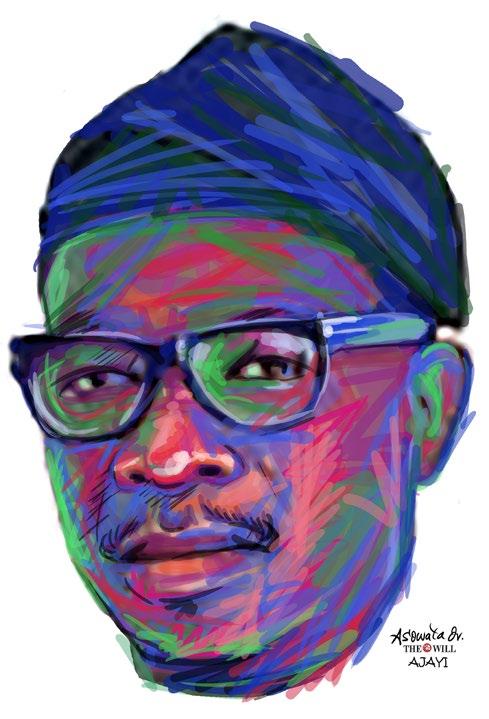

ticket
aided by a National Working Committee member of the party, Taofeek Arapaja, Deputy National Chairman, South.
In reality, the contest is between the governing APC and opposition PDP. As a measure of their electoral strength, APC controls 24 lawmakers and PDP six in the House of Assembly. APC controls the three senatorial districts, having won all the seats during the 2023 general election. Of the nine House of Representatives members, the party has eight, leaving one to the rival PDP. Moreover, it controls the governorship
In spite of its small electoral strength as measured by its elected and appointed officials, the opposition party seems to have a good geo-political image working for it. That is the two governors on its platform out of six in the South-West geopolitical zones. They are Governor Seyi Makinde of Oyo State and Ademola Adeleke of Osun State. Both of them have taken it as a duty to work the grassroots in support of the Agboola/
According to Makinde, all PDP leaders and stakeholders from across the six South-West states are behind the Ondo PDP candidate.
He said at a recent stakeholders meeting; “For us, people should expect a very strong showing from the PDP in the state in November, by the grace of God. With our leaders from across the South-West standing behind our candidates in the state, I think it is a strong signal to the present occupier of the Ondo Government House. The PDP is coming and it will happen.”
Makinde’s Osun counterpart, Governor Ademola Adeleke of Osun, at the meeting sounded upbeat and optimistic.
“We also want to begin the reconciliation process, because we know some people are upset and we believe our leaders will go back home to bring everybody together. Even Governor Makinde and I would be invited to Akure to see how we can move forward in the state ahead of the election in November,”Adeleke said.
Obviously appreciative of the big support of leaders from the geo-political zone, Agboola said the support would be enough to coast him to victory.
He said: “The leaders have spoken. They are leading and we will follow. I thank them for their massive support, especially the two Southwest governors, Seyi Makinde and Ademola Adeleke. They have been of tremendous support and encouragement for the party in the states. PDP is very formidable. All of us are here because we believe this is one family and we are going to deliver. Victory is certain for us in the next election.”
A candidate who seems to be making waves, not necessarily from any visible political strength but rather from the ripples that his surprised exit from the APC caused, is the candidate of New Nigeria Peoples Party, NNPP, Olugbenga Edema.
He is one of those aggrieved over the outcome of the party primary. Inconsolable, he decided to defect to the New Nigeria Peoples Party, NNPP. He had to replace the party’s candidate, Oluwatosin Ayeni, who agreed to step down. For Edema, a former representative of the state on the governing board of the Niger Delta Development Commission, NDDC, the NNPP would be the party to beat in the forthcoming poll.
He, like almost all of the candidates, hails from the South Senatorial zone to which many of the parties derived their candidates, in respect of the zoning formula. It is yet to be seen how his exit can impact on the governor’s showing in the zone, moreover when President Tinubu is said to keep a keen eye on developments in “his southwest backyard.”

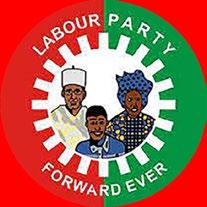

According to WASHNORM reports of UNICEF, approximately 48 million Nigerians still engage in open defecation and only 8 per cent of the population practice clean handwashing. Furthermore, 23 per cent of Nigerians lack access to basic water supply services and only 10 per cent have access to a combination of basic water, sanitation, and hygiene services
It is sad that Cholera is still stalking the country, especially at this time that most Nigerians are at their wits end over the grinding poverty, hunger and hardship in the land.
Facing one of the worst cost of living crises in decades, Nigerians can easily become ill-adjusted because of the ravaging cholera.
According to the Nigeria Centre for Disease Control and Prevention, NCDC, the increasing cases of the disease nationwide has claimed 30 deaths, 141 suspected cases and 65 confirmed reported cases.
Director-General of the Centre, Dr Jide Idris, said the cases, which started between January and June 11, 2024, were reported from 96 local government areas in 30 states. Of this number, 10 states are critically affected. The critical states affected by the outbreak are Abia, Bauchi, Bayelsa, Cross River, Delta, Imo, Katsina, Lagos, Nasarawa and Zamfara.
In fact, as of Friday, Lagos State alone has accounted for 24 deaths and 417 cases, according to the Commissioner for Health, Professor Akin Abayomi. The state noted that it is infected with “the highly aggressive and contagious strain,” of Cholera.
All things considered, the outbreak of the disease is a sad commentary on the health management system in the country. A country with a broken health system, wherein doctors and nurses wait patiently to complete their studies and then emigrate abroad for practice, should not gloat over the outbreak of a contagious disease like Cholera.
With the intensification of the rainy season during which the cases would trend, things are going to get worse
before they get better.
A look into causes of cholera infection as listed by the NCDC shows how the appalling health system and insanitary habits among the people has become a major culprit.
According to DG Idris, people of all ages living in places with limited access to clean water are at risk.
He explained that disease can be prevented by ensuring access to safe, potable drinking water, proper sanitation and waste disposal, as well as appropriate hygiene, including regular handwashing.
Idris advised Nigerians to reduce the risk of cholera by ensuring that water is boiled and stored in a clean, covered container before drinking.
He said people should practice good personal hygiene by washing their hands frequently with soap under clean running water, ensuring that food is well cooked before consumption, avoiding open defecation, indiscriminate refuse dumping, ensuring proper disposal of waste and frequent clearing of sewage, among others.
He explained that cholera is a food- and water-borne disease, caused by the ingestion of the organism Vibrio cholera in contaminated water and food, adding that water is usually contaminated by the faeces of infected individuals.
The talk about lack of potable drinking water, improper waste disposal, open defecation, frequent cleaning of sewage and drainages, indiscriminate dumping of refuse sounds familiar.
With one year left in Nigeria's Road Map, launched in 2018, to achieve an open-defecation free country in 2025, the numbers tell a different, frightening picture.
According to WASHNORM reports of UNICEF, approximately 48 million Nigerians still engage in open defecation and only 8 per cent of the population practice clean handwashing.
Furthermore, 23 per cent of Nigerians lack access to basic water supply services and only 10 per cent have access to a combination of basic water, sanitation, and hygiene services.
Years of official neglect in providing basic infrastructure in almost all sectors of the economy, coupled with manpower shortage, as it currently obtains in the health sector, has contributed in no small measure to afflictions like the current Cholera disease.
It is not too late for government at all levels to begin to reverse this ugly trend by taking appropriate measures to commit to remedial policy implementation.
As for the current Cholera cases, we urge the relevant agencies to embark on public enlightenment through churches and mosques, markets, schools, parks, and other public places. Correct information is as key in fighting contagious diseases as the application of correct diagnosis and treatment.
The 10 states that are listed with critical cases of outbreak of the disease should liaise properly with the multi-sectoral National Cholera Technical Working Group, led by the Nigeria Centre for Disease Control and Prevention (NCDC) and comprising the Federal Ministries of Environment and Water Resources, the National Primary Health Care Development Agency (NPHCDA), the World Health Organisation (WHO), United Nations Children’s Fund (UNICEF), for the required support in these trying times.


oor maternal health and high infant mortality rate are twin issues that have long plagued women in sub-Saharan Africa, especially in Nigeria. Well-meaning efforts are being geared towards significantly reducing the infant mortality rate, with the United Nations setting targets for countries to achieve set goals under its Sustainable Development Goals (SDGs) initiative, with a
Committing nations to meet SDG 3, the UN has set a goal on good health and well-being, targeting the reduction of maternal mortality. In fact, the objective is to reduce the global maternal mortality ratio to less than 70 per 100,000 live births
As well, it has projected that by 2030, countries should have ended preventable deaths of newborns and children under five years, with all countries aiming to reduce neonatal mortality to as low as 12 per 1,000 live births and under-five mortality to at least as low as 25 per 1,000 live births.
In solidarity with the global efforts, Access Bank has carved a niche, not just as a leading financial institution but also as a vanguard of social responsibility. This commitment reflects not just corporate social responsibility but a deep-seated belief in fostering sustainable communities, playing a pivotal role in improving
Access Bank has adopted a holistic approach to ensure the safety and health of mothers. Throwing its weight behind Project Agbebi and Uwar Seeking to achieve a reduction in maternal mortality rates in the southern and northern parts of the country, respectively. The overarching objective was to adopt
Implemented in partnership with HACEY Health Initiative and Mo Baby Care across various states in southern Nigeria, namely Ebonyi, Ogun, Osun, Oyo, Akwa-Ibom, Kwara, Abuja, Delta, Kano, Kaduna, Enugu, Abia, Ekiti, Ondo, Taraba, Edo, Gombe, Plateau, Borno, Kaduna, Jigawa, Katsina & Anambra,
this initiative has led to increased knowledge and awareness for over 5,000,000 people through media campaigns and has facilitated the distribution of 69,735 birthing kits to pregnant women and health attendants.
Furthermore, 2,090 traditional birth attendants have been trained on safe birthing practices; 120 maternal health support groups have been established; 21,848 IEC materials provided to facilitate learning; while 2,514,600 members of the various communities were directly trained on maternal health practices and financial literacy.
The ‘W’ Initiative
In July 2014, Access Bank launched the ‘W’ Initiative to empower female entrepreneurs in Nigeria through financial inclusion and liberation. This comprehensive programme encompasses all of Access Bank's women empowerment offerings, including capacity building, mentoring, and maternal health services. The Initiative’s goal is to create a stronger, more sustainable society by equipping women with the tools and resources they need to succeed.
The ‘W’ Initiative provides participating women and their families with access to loans, credit facilities, and the “W” community, where they can gain insights on managing finances and increasing productivity. Additionally, the community offers valuable information on special offers for home, health, beauty, and fitness. Furthermore, through the W Health Loan, the Initiative offers a tailored health insurance plan that covers a range of medical services, including maternal health. This plan ensures that women can afford quality care during pregnancy and childbirth. The loan, which serves as the new umbrella product for all health loans available under the W Initiative, comes in three variants. One of these is the Maternal Health Service Support (MHSS) – a flagship product designed to provide discounted financing for fertility procedures, natal support and specialised procedures peculiar to women.
Through its financial products and healthcare partnerships, Access Bank has contributed to a noticeable reduction in maternal mortality rates in communities where these programmes are implemented. The affordable loans and health insurance plans have enabled more women to access timely and quality care.
The MHSS, which is present in Nigeria, Ghana, Rwanda, Mozambique and Zambia, is positioned to help women and families overcome barriers to good health and wellbeing. It is a social impact product and a key component of the ‘W’ Initiative. Often referred to as the baby-making product, it is a premier product in Africa which has impacted over 156 women and families with access to finance on various health procedures worth N241.5Mn and has birthed 103 babies through the discounted health financing scheme. Two additional health loan variants have been added to cover medical emergencies and cancer treatments.
•Eze is a health management practitioner.

*Continues online at www. thewillnews.com
The New York Times report, "Nigeria Confronts Its Worst Economic Crisis in a Generation" published on June 11, 2024, portrays a bleak outlook on Nigeria's economic state. However, the report lacks objectivity and may inadvertently misinform readers.
It is essential to present a more balanced viewpoint that takes into account the wider context, including global economic trends and challenges shared by other nations. Moreover, it is imperative to highlight the proactive measures undertaken by the current Federal Government to address these issues and the inherited economic challenges it faces.
By offering a comprehensive perspective, we can understand better the complexities of Nigeria’s situation and the efforts made towards sustainable growth and stability.
The report failed to mention that inflation is a global issue affecting many countries, not just Nigeria. By not acknowledging this, the report gives the impression that Nigeria’s inflation is an isolated problem, which is misleading. Additionally, when comparing the size of economies, it is essential to remember that they are typically valued in dollars. Therefore, individual country exchange rate policies may affect such comparisons.
A country’s economic size appears smaller when its currency is devalued. For instance, a country that defends its currency might seem to be doing better economically than a country that floats its currency, although the latter may be making more sustainable long-term economic decisions.
Labour Union strikes did not start under this government. Even the previous administration experienced various strikes by numerous unions, with the ASUU strike being one of the longest. The current government should be commended for its proactive approach to addressing the demands of organised labour. However, the government and organised labour must find more effective ways to resolve disputes so as to prevent the economic losses caused by strikes.
When President Bola Tinubu assumed office a year ago, it inherited an economy in a comatose state. The amount used for debt servicing was already over 90 per cent of Nigeria’s revenue, making most expenditures reliant on borrowing. This situation was unsustainable, necessitating significant economic reforms. The New York Times report overlooks the fact that the current administration is dealing with long-standing economic issues rather than creating new ones. It is also important to recognise that high infrastructure deficits and security challenges are inherited issues that the government is actively addressing.
Faced with an untenable economic situation, the Bola Tinubu Administration took bold decisions to remove fuel subsidies and float the naira. These measures were necessary to reduce the financial burden on the country and free up funds for critical investments in infrastructure and other sectors. While these reforms caused short-term economic shocks and hardship, they are essential for Nigeria’s long-term economic health.
Many Nigerians question where the money saved from these reforms has gone. It is important to note that savings can be actual revenue saved or money that would have been borrowed but wasn’t. The
removal of fuel subsidies and the floating of the naira has reduced the need for borrowing and allowed the government to redirect funds to more productive uses.
The New York Times report does not highlight the government’s efforts to mitigate the hardships caused by economic reforms. To alleviate the situation, the Federal Government started paying N35,000 cash awards to federal civil servants, with various state governments following suit by paying varying amounts to their workers.
THE PROBLEMS OF MANY YEARS CANNOT BE SOLVED OVERNIGHT, BUT A COMMITTED AND BALANCED APPROACH CAN PAVE THE WAY FOR SUSTAINABLE GROWTH AND DEVELOPMENT
Additionally, the government is about to conclude a new, improved national minimum wage, with a bill about to be sent to the National Assembly. Furthermore, the government has initiated conditional cash transfers and distributed thousands of metric tonnes of assorted grains to support vulnerable households. It has also introduced a student loan scheme to enhance access to tertiary education. The Dangote refinery is scheduled to commence production of premium motor spirit by the end of July. This holds promise for alleviating the impact of fuel subsidy removal by potentially lowering the prices of PMS.
Among other things, the report failed to acknowledge the current government's significant achievement in clearing the $7 billion forex backlog owed to foreign companies, a move that has boosted investor confidence.
Critics argue that foreign companies are leaving Nigeria due to poor economic decisions, making the country unattractive for investment. However, this is not always the case. Companies may shut down operations for various reasons, including changes in business models or the inability to cope with competition from substitute products or services. For example, GlaxoSmithKline ceased operations in Kenya and Nigeria, opting for a third-party distribution model for its pharmaceutical products.
While Nigeria is facing economic challenges, it's important to provide a balanced perspective that takes into account the global context, historical issues and the current government’s efforts. The present administration has taken necessary but painful steps to address long-standing economic problems. These reforms, though causing short-term hardship, are essential for Nigeria’s long-term economic stability and growth. However, the government must remain committed to these reforms and ensure transparent communication with its citizens. Problems of several years cannot be solved overnight, but a committed and balanced approach can pave the way for sustainable growth and development.

Amid Nigeria’s rising public debt, the Federal Government will borrow additional N450 billion via bond auction slated for June 2024.
The Debt Management Office (DMO) has announced that the transaction is in furtherance to the government’s focus on domestic borrowing to finance its budget.
The bond offer will be conducted by auction and comprises three different re-openings, each with distinct maturity dates and interest rates.
The June 2024 bond offer includes:
N150 billion at 19.30 per cent FGN APR 2029 (5-Year Re-opening)
N150 billion at 18.50 per cent FGN FEB 2031 (7-Year Re-opening)
N150 billion at 19.89 per cent FGN MAY 2033 (9-Year Re-opening)
The auction date is scheduled for June 24, 2024, with settlement on June 26, 2024. The minimum subscription requirement is N50,001,000, and subsequent bids must be in multiples of N1,000.
The offer is pursuant to the Debt Management Office (Establishment) Act 2003 and the Local Loans (Registered Stock and Securities) Act, CAP. L17, LFN 2004, providing a legal framework for the bond issuance.
Interested investors can subscribe to the bonds through any of the authorized Primary Dealer Market Makers (PDMMs), which include leading financial institutions such as Access Bank Plc, First Bank of Nigeria Ltd, Stanbic IBTC Bank Ltd, Citibank Nigeria Ltd, and others
EDITOR Sam Diala
The bond auction was initially scheduled for June 17, 2024. However, in a recent public notice, the DMO announced a change in the auction date for the June 2024 bond offer.
The auction was moved to June 24, 2024, due to the Federal Government’s declaration of June 17 as a public holiday to mark Eid Al-Adha. The settlement date remains June 26, 2024.
Continues on page 15
N127.10bn
‘Fidelity Bank’s N127.10bn Capital Raise to Strengthen Market Position, Global Presence’- Onyeali-Ikpe
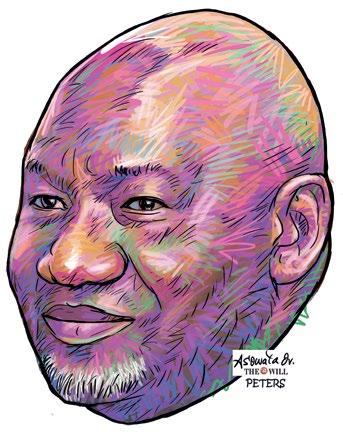
The audacious launch by Aiteo Group and Bravura, two entities founded by Nigerian-born African billionaire and oilman, Benedict Peters, into Zimbabwe, Mozambique and the Congo and the impressive half year numbers of the former, Nigeria’s indigenous foremost independent energy operator, has put the businessman in the spotlight once again. Last week, THEWILL reported exclusively that Aiteo Eastern Exploration and Production Company (AEEPCO) recorded crude sales of $325m about N471 billion in the first half of this year in its operations in Nigeria.
The information received from banking sources, further stated that the remarkable performance has reinforced the firm’s optimism for a N1 trillion revenue target for 2024.
Aiteo which operates OML 29, a joint venture asset it co-owns with NNPC, had shut down production for almost two years due to crude oil theft and vandalisation of its assets by thieves. It resumed operations in Q4 last year and has steadily ramped up production in the asset that has the capacity to produce an estimated 100, 000bpd.
The company also recorded remarkable exploits in Southern Africa with its successful acquisition of a Mozambique gas asset, Mazenga. With this development, Aiteo becomes the operator of the asset which contains some of the biggest onshore gas reserves in sub-Saharan Africa.
Announcing the spectacular feat, Aiteo revealed that the
acquisitiondeal which places it in charge of the block, was formalised througfarm-in arrangements with Mozambique's National Hydrocarbons Company (ENH).
Industry experts who reacted to the development see it as tremendously positive. “The economy has been quite challenging these times, especially in Nigeria which is still plagued by oil theft, low production, rising inflation, painfully high exchange rate regime and the lingering spate of policy inconsistency, a euphemism for corruption.
“The push to consolidate the gains of its corporate strategy towards continental dominance is a huge plus for Aiteo,” said Engr Ken Amadi, an oil and gas operator.
“It is instructive that the experience from Nigeria’s tough operating environment would guide Aiteo, or other indigenous firms launching into the continental space, to aim at excellence,” Amadi added in a note to THEWILL.
For instance, the expertise acquired by the Nigerian operators in Engineering, Procurement, Installation, Operation and Maintenance (EPICOM) space equips them to undertake a wide range of technical jobs in the regions.
These include installation and servicing of the metering system, construction of loading bay, LPG installation, tank farm construction, installation of actuators, colons, mechanical seals, valves, steam trap and other process
Continues on page 15

equipment.
It is instructive that the experience from Nigeria’s tough operating environment would guide Aiteo, or other indigenous firms launching into the continental space, to aim at excellence
Aiteo has so far shipped around 3 million barrels of Nembe Crude Oil Blend for the half year and is steadily increasing output, according to banking and shipping records seen by THEWILL.
In January 2024, the vessel MT AQUABLISS loaded 233, 655, while 954,176 barrels were loaded on the vessel named AEGEAN MARATHON in February 2024. MT Delta Kanaris loaded 953, 252 in March 2024, while in May 2024, MT POPI P loaded 957, 757 barrels, according to data obtained by THEWILL. Nembe Blend average for the period was around $86pb and exchange rate on Friday was around N1485 – $1.
Aiteo has not commented officially since the report was published last week.The disclosure which should boost the confidence of its stakeholders will also impress the financial services institutions which co-funded the over $3bn OML 29 asset acquisition in 2014.
The consortium of lenders that committed about $2bn according to data seen exclusively by THEWILL include: Zenith – $323m, First Bank - $300m, GTB - $300m, Fidelity Bank – $175m, AFC – $125m, Ecobank Nigeria and Union Bank – $100m each, Sterling Bank – $60m and Shell Western – $512m.
Peters’ initial equity contribution for the purchase was $898, 237,697.35 in cash with an additional $257m injected at closing for fees and other ancillary costs and costs to restart production. Other small equity holders contributed $136m, which the banking sources said Aiteo is already in the process of buying out.
The Nembe Crude Oil grade has a low sulphur content and low carbon footprint due to flare gas elimination, fitting perfectly into the required spec of major buyers in Europe.
THEWILL reports that Aiteo’s sister company, Bravura Holdings, a mining company with operations mainly in Southern and Central Africa, has also seen its fortunes on the rise after securing mining deals for lithium production in Zimbabwe, Mozambique and Congo.
Bravura recently announced the completion of Zimbabwe’s first world-class lithium facility, the Kamativi Lithium plant with an annual producing capacity of 30, 000 tonnes. The successful continental expansion drive is a major milestone for any Nigerian owned energy company.
Coming at a time when the gas business is caught up in the web of intense geopolitical crossfire between the West and the East, Africa has become the beautiful bride, as far as the commodity is concerned. According to industry experts, this gives Aiteo an edge.

The Managing Director and CEO of Fidelity Bank Plc, Nneka Onyeali-Ikpe, has said that the bank’s N127.10 billion capital raising initiative is set to enhance its market position and expand its international footprint.
Onyeali-Ikpe stated this at the “N127.10 billion Public Offer and Rights Issue Facts Behind the Combined Offer” event at the Nigerian Exchange Limited Headquarters in Lagos.
She noted that Fidelity Bank is the first Nigerian bank to launch a public offer following the Central Bank of Nigeria’s (CBN) directive on banking sector capitalization issued in March 2024.
On June 20, 2024, Fidelity Bank commenced its public offer of 10 billion ordinary shares at 50 kobo each, priced at N9.75 per share, alongside a rights issue of 3.2 billion ordinary shares at 50 kobo each, priced at N9.25 per share.
Onyeali-Ikpe said that the financial institution’s N127.10 billion capital raising exercise is to be considered as a pacesetter in the life of the banking industry capitalisation drive.
She noted that the bank’s capital-raising process was practically initiated after obtaining approval from shareholders in August 2023, stressing that
The primary objective of this bond offer is to raise substantial capital to support the government’s fiscal policies and infrastructure development.
By issuing these bonds, the FGN aims to attract both local and international investors, thereby increasing the financial inflow into the country’s economy.
These funds are crucial for financing key projects in sectors, such as transportation, healthcare, education, and power.
Moreover, the raised capital will help the government meet its budgetary commitments and reduce the reliance on external borrowing, which often comes with stringent conditions and higher interest rates.
Although the government also planned to raise N450 billion in the previous month’s auction, it ended up raising N380.769 billion despite the oversubscription of the bonds.
The amount raised was 39% less than what was raised in the April FGN bond auction.
The aggregate subscription across all tenors was N551.316 billion, far lower than the N920.088 billion in subscriptions recorded in April 2024.
However, the DMO also recorded a non-competitive allotment of N301.300 billion, suggesting continued interest from certain institutional investors, despite the broader market’s reticence.
THEWILL reports that Nigeria’s public debt rises by N24.33 trillion in three months according to data by the DMO.
The nation’s total public debt increased significantly to N121.67 trillion (approximately $91.46 billion) as of March 31, 2024.
The DMO said this figure encompasses the combined domestic and external debts of the Federal Government of Nigeria (FGN), the thirty-six state governments, and the Federal Capital Territory (FCT).
In comparison, the total public debt as of December 31, 2023, stood at N97.34 trillion (approximately $108.23 billion). This represents a substantial increase of N24.33 trillion or 24.99 per cent within a three-month period.
The increase is driven majorly by naira devaluation, as the total debt was reduced in dollar terms by $16.77 billion or 18.34 per cent.
The breakdown of the total debt as of March 31, 2024, shows that the domestic debt component was N65.65 trillion (approximately $46.29 billion), while the external debt component amounted to N56.02 trillion (approximately $42.12 billion). This means that 53.96 per cent of the total debt are owed to domestic creditors.
The statement from the DMO also noted that excluding the impact of naira exchange rate movements in the first quarter of 2024, the domestic debt saw a marked increase from N59.12 trillion at the end of December 2023 by N6.53 trillion or 11.05 per cent.
This rise is attributed to new borrowing undertaken to part-finance the 2024 Budget deficit and the securitization of a portion of the N7.3 trillion Ways and Means Advances at the Central Bank of Nigeria (CBN).
The statement from the DMO read: “Nigeria’s Total Public Debt, comprising the Total Domestic and External Debts of the Federal Government of Nigeria (FGN), the thirty-six (36) state governments, and the Federal Capital Territory (FCT), stood at N121.67 trillion (USD91.46 billion) as at March 31, 2024. The comparative figure for December 31, 2023, was N97.34 trillion (USD108.23 billion). Total Domestic Debt was N65.65 trillion (USD46.29 billion) while Total External Debt was N56.02 trillion (USD42.12 billion).
“Excluding Naira exchange rate movements in Q1 2024, only the Domestic Debt component of Total Public Debt grew from N59.12 trillion on December 31, 2023, to N65.65 trillion on March 31, 2024. The increase was from new borrowing to part-finance the 2024 Budget deficit and securitization of a portion of the N7.3 trillion Ways and Means Advances at the Central Bank of Nigeria.”
the exercise is part of the management’s strategic growth plan to raise additional capital to meet its growth needs.
“Given that Fidelity Bank has already started the process of raising additional capital ahead of CBN’s directive, requiring the banks to raise a minimum capital base of N200 billion for national banks and N500 billion for banks with international operations like ours, amongst other capital requirements.
“This didn’t come as a surprise to us. As for us at Fidelity Bank, the CBN recapitalization directive presents a significant opportunity for a stronger and more resilient banking industry.
“We have embraced the challenge as a catalyst to propel us, towards a long-term vision of becoming a market leader across every product that we offer and segment that we sell, not just in Nigeria, but as an international bank,” she said.
Onyeali-Ikpe noted that proceeds from the N127.10 billion capital-raising exercise would be instrumental in achieving its strategic growth plan.
She highlighted that the funds, firstly, would be deployed to drive, business and regional expansion.
“We will strategically expand our footprints within and outside Nigeria to serve a broader customer base and to unlock new market opportunities.
“Secondly, we will have what we call technological transformation. We are committed to leveraging proprietary technology to improve operational efficiency and deliver exceptional customer service.
“Thirdly, we intend to diversify and grow. By investing in IT infrastructure and product distribution channels, we will aim to diversify our earnings base through digitalization and business expansion,” she said.
She noted that the offer will increase the bank’s capacity to support its customers and their businesses. I
“In summary, this capital raise will help our customers to grow, their businesses to thrive, and their economy to prosper,” she said.
Onyeali-Ikpe said that the management recognized the importance of investors and is committed to delivering value to them as well.
“Our track record of accelerated growth and consistent dividend payment is a testament to this,” she explained.











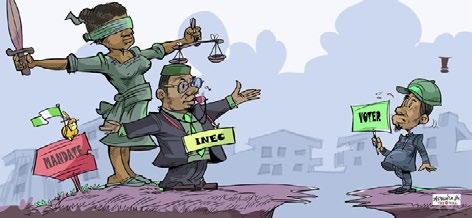








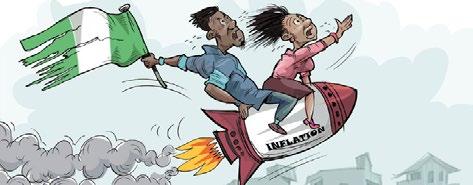












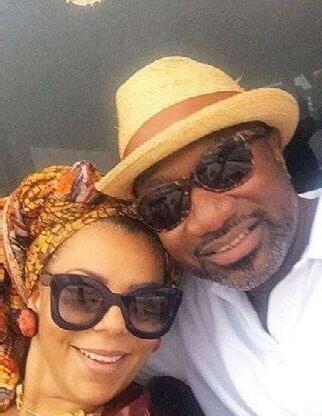






The annual Ojude Oba (the king’s forecourt) 2024, an ancient festival celebrated by the Yoruba, particularly the people of Ijebu community in Ogun State. This year’s event took place on Tuesday, June 18 on the third day after the Muslim Eid-el Kabir Festival. As always, it was colourful, glamorous and in every sense, a profound display of Yoruba cultural heritage which featured parades, traditional attires and cultural performances.
Ojude Oba Festival is regarded as one of the biggest and most consistent cultural events in southwestern Nigeria. Little wonder, President Bola Tinubu is considering its inclusion in the United Nations Educational, Scientific and Cultural Organisation, UNESCO’s world cultural heritage.
The Governor of Ogun State, Dapo Abiodun, admitted that plans are underway to make Ojude Oba festival a symbol of unity and a rallying point for the Ijebu people, as well as a global festival, attracting national and international audiences. He also expressed gratitude to President Tinubu for his support, including plans to include the festival in UNESCO’s world cultural heritage. At this year’s edition, different cultural age groups composed of indigenes, their friends and associates paraded at the front courtyard of the king’s palace. The festival was overseen by the Awujale of Ijebuland, Oba Sikiru Adetona,. The parade was also an opportunity to showcase the rich cultural fashion and heritage of
the Ijebu and their revered traditional ruler, thereby promoting the development of Ijebuland and preserving its traditions for posterity.
One of the key features of the festival was the 'Regberegbe' (age grade) competition that saw some age grade groups emerge winners. The 'Egbe Bobasete Okunrin Omooba' won the contest, with 'Egbe Bobagunte Okunrin Akile Ijebu' coming second and 'Egbe Bobamayegun Okunrin Asiwaju' finishing in the third position in the male category.
'Egbe Bobagunwa Obinrin Omooba' won the competition in the female category, while 'Egbe Bobagunwa Obinrin Asiwaju' and 'Egbe Arobayo Obinrin Akile Ijebu' emerged as runners-up, taking home the same awards as their male counterparts.
Another highlight of the festival were the horse riders. Each rider representing his family or clan rode his horse to pay homage to the Awujale.
Some prominent Ijebu sons and daughters who came from far and near to attend the event included, Olusegun Osoba, a former Governor of Ogun State; Deputy Governor, Noimot Salako-Oyedele; Chief Sunny Kuku, the Ogbeni Oja of Ijebuland; Omogbolahan Olasunkanmi Wasiu Ayinde, Olori Omo Oba aka KWAM1 and his wife, Ropo, among several others.
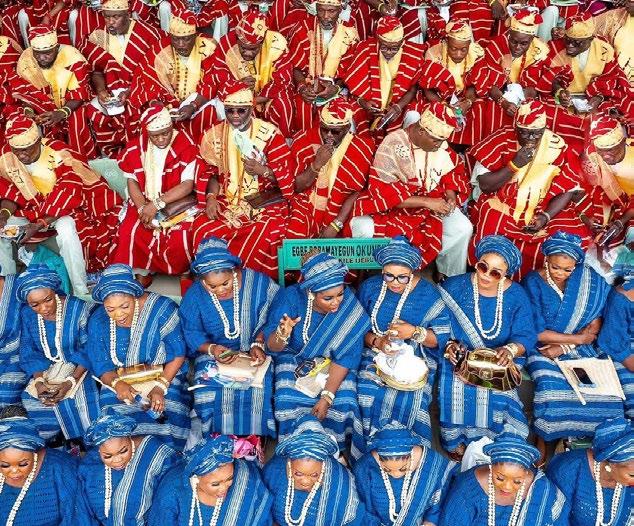


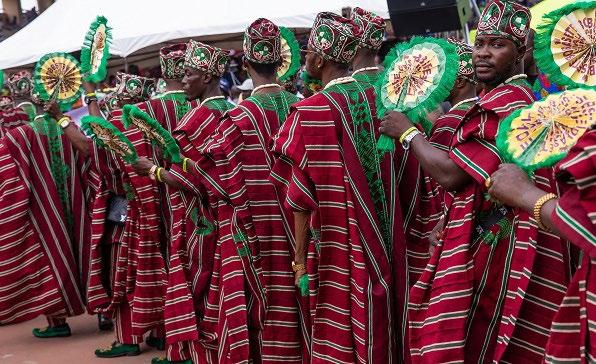
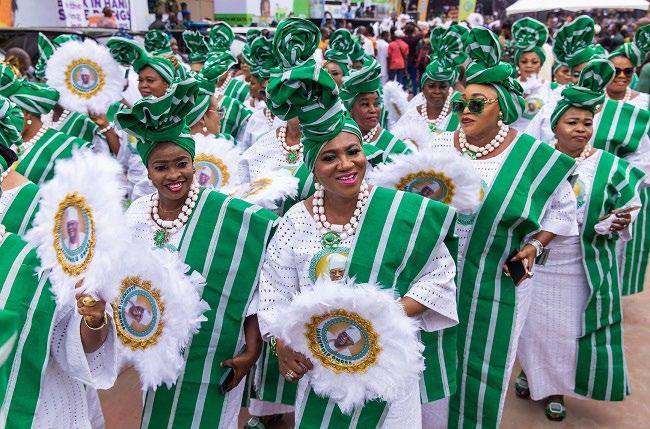


H
e literally stole the show, winning the hearts of those physically present at the Ojude Oba festival and netizens with his charm, charisma and composure. He was the cynosure of all eyes. The 58-yearold is the managing director of NG Clearing Limited. An alumnus of Ijebu-Ode Grammar School and King’s College, Lagos, Oreagba earned a degree at Edward Greene’s College, Oxford in London and secured a Bachelor of Engineering, Combined Engineering Studies from Coventry University from 1985 to 1989. He has over 30 years experience in the finance industry. Most recently, he was a member of the Derivatives Product Advisory Committee of the Nigerian Stock Exchange before taking on his current position in 2023.
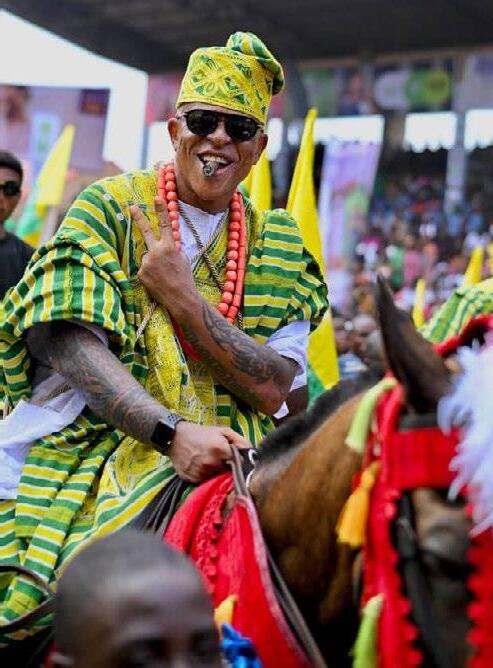
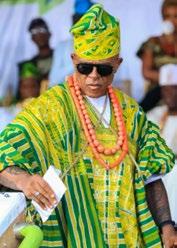
Although there were many horse riders at the festival, a few caught the attention of THEWILL:


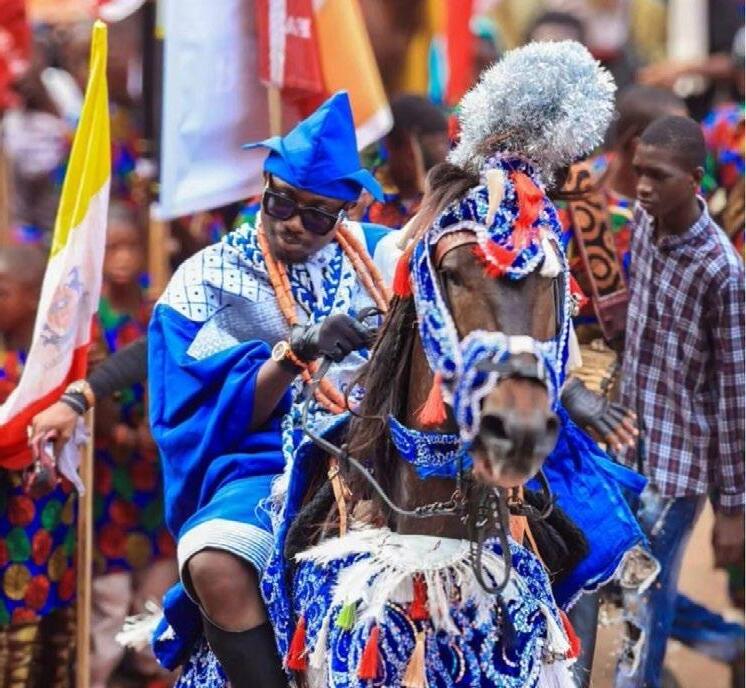

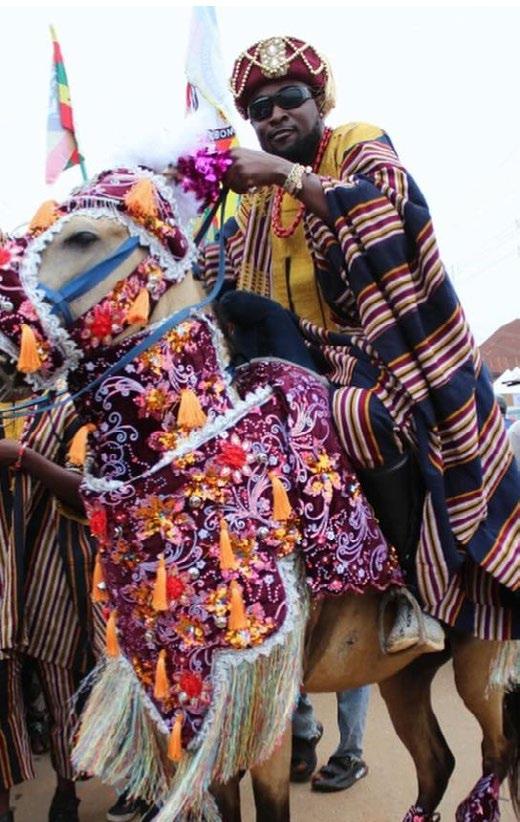




 One of the few female horse riders at the event is the daughter of late Prince Abdul Gafar Adebayo Ajigboteso aka Aleshinloye Bayo
He is the son of Omo Oba Jadi Ara
Prince Adeboye Kasali
One of the few female horse riders at the event is the daughter of late Prince Abdul Gafar Adebayo Ajigboteso aka Aleshinloye Bayo
He is the son of Omo Oba Jadi Ara
Prince Adeboye Kasali


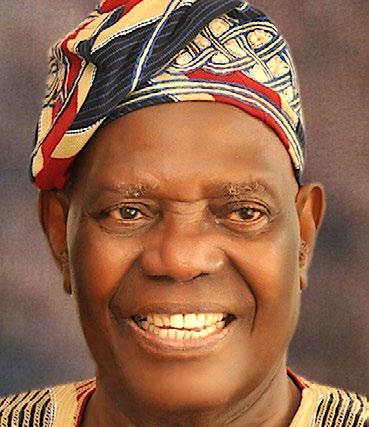





Continued from page 18

So, EnjoyCorp acquired 100 per cent shareholding in The Raysun Nigeria Limited, which in turn holds the 86.5% stake in Champion Breweries Plc listed on the Nigerian Exchange Group. The Akwa Ibom State Government has a 10 per cent stake, while the public has the remaining 5 per cent stake.
The acquisition comes four months after an agreement was reached with Heineken B.V. to acquire 100 percent of its shareholding in Champion Breweries Plc. The acquisition was completed after the approval of the regulatory bodies. EnjoyCorp, the new majority shareholder now has a market capitalisation of N28.99 billion, according to records on the Nigerian Exchange Limited. However, what wasn't mentioned is the ownership of EnjoyCorp Limited which made the acquisition. The company is owned by Ehimare Idiahi, a 43-year-old who only just registered EnjoyCorp Limited, about four-months ago in the United Kingdom with the registered office located in London. He is the only active director, according to filings with the UK authorities, and he was appointed by EnjoyCorp on February 7, 2024.
According to the UK Government website, Idiahi’s total number of appointments is nine, including as a director of Emple Group Limited where he assumed the role on February 26, 2023. Emple Group has the same registration address as EnjoyCorp. He is also a director of Evercorp Industries Limited, an appointment he assumed on October 24, 2022, and Kanuri MPL Limited, registered at Bourdillon Road 28 Ikoyi, Lagos on November 23, 2021, among several others.
Continued from page 18
reunited, but also live together in one of Femi's homes in the Federal Capital Territory. Their choice of Abuja may not be unconnected to their desire to be far away from the prying eyes of members of the Lagos social circuit who were very familiar with the inner workings of their marriage and how it all went down a few years ago. The need to distance themselves from familiar territories while they rekindle their romance in a totally new environment may just be what they need to take their marital status back to status quo. Not a few are aware that the couple had a very bitter divorce a few years ago which they managed to keep under wraps, but not without the knowledge of a few society watchers.
So bitter was the divorce that Nana decided to be away from the public glare. She began to make some disappearing acts for months on end, only coming into the country on very short trips, which
were few and far between. She made sure she was conspicuously absent at the lavish 90th birthday of her mother in-law, Lady Christine Doja Otedola. Many had looked forward to seeing her at the party, if for nothing, at least for old times' sake and the good times she shared with the nonagenarian. But her absence only proved that she had moved on completely at that time and save for her children, she would rather not have anything to do with the Otedolas again. The couple managed to keep up appearances thereafter, albeit, without being emotional. For instance, Nana was active during Femi's 60th birthday last year, leaving many to wonder what could be amiss. Earlier this year, during the wedding of Nollywood actor, Kunle Remi, to a member of the Otedola's family, Nana was present alongside other members of the Otedola family, looking radiant in her ensemble and representing well.
Fatai Aremu Ojora Takes a New Queen

The Ojora of Lagos, His Royal Highness, Oba Fatai Aremu Aromire Ojora, has expanded his harem by taking on a new queen. The new queen, who is the number three Olori, is socialite and businesswoman, Alhaja Amoke Muritala, more popularly known as Iya Musa. Over three years ago, Oba Ojora, who has spent no less than 30 years on the throne, took a young lady named Funmilayo as his new wife, several years after he married the wife of his youth. The first wife was not happy about his decision and chose to move out of the palace. Despite entreaties and pleas from very influential people and family members, the first wife
refused to change her stance. Still not satisfied with the bosom of Olori Funmilayo, the traditional ruler decided to pick a third wife. Formalities for the wedding were completed three weekends ago at the bride’s hometown in Ilorin, the Kwara State capital. Traditionally, Yoruba kings don’t appear in person at their wedding ceremony, hence Oba Ojora sent a highpowered delegation, including his white cap chiefs and other eminent personalities, to perform the wedding rites on his behalf. Expectedly, the new bride's friends were on hand to felicitate with her and to support her in her new journey to her new marital status.
Idiahi Emordi Obanikoro Akande Olanipekun The Ojoras GawunaPhoto Editor: Peace Udugba [08033050729]

State Governor, Professor Chukwuma Charles Soludo (7th
Pro-Chancellor/ Chairman, Chukwuemeka Odumegwu Ojukwu University (COOU), Professor Chidi Odinkalu, (6th
Amb. Bianca Odumegwu-Ojukwu (5th Left); and other Members of the council, as Soludo Inaugurates COOU Governing Council, at the Executive Council Chambers, Government House, Awka on June 19, 2024.

Vice President, Supra-North, National Christian Men's Fellowship of the Anglican Church; Afam Nwanna, former Minister of Information, Prof Jerry Gana, former Head of State, Gen.Yakubu Gowon, President, Christian Men's Fellowship (CMF) of St Matthews Anglican Church, Maitama, Sir Oghenekaro Jockey, former President of CMF, Akinlolu Kehinde, SAN and former President, CMF, Azu Azuike, during a musical presentation to mark the 2024 Father's Day in Abuja on June 16, 2024.
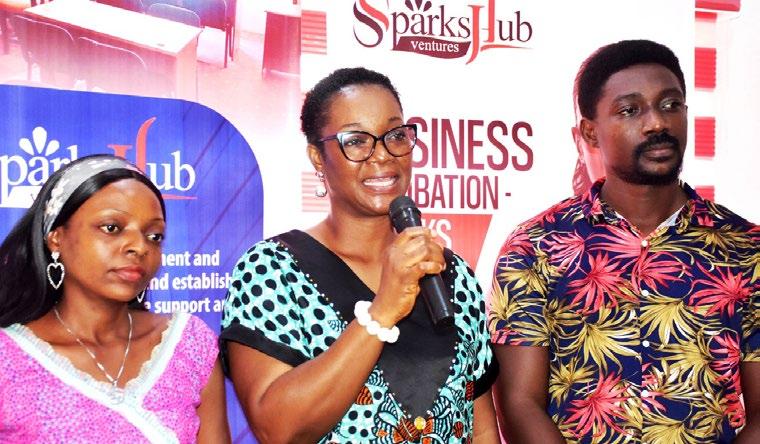

Deputy Governor of Cross River State, Hon Peter Odeh;
of the Senate, Godswill Akpabio; South South Zonal Vice
National Publicity Secretary, Felix Morkaka; Senator Ovie
and Minister of Aviation and Aerospace Development, Festus Keyamo, at the South
in Calabar on June 16, 2024.
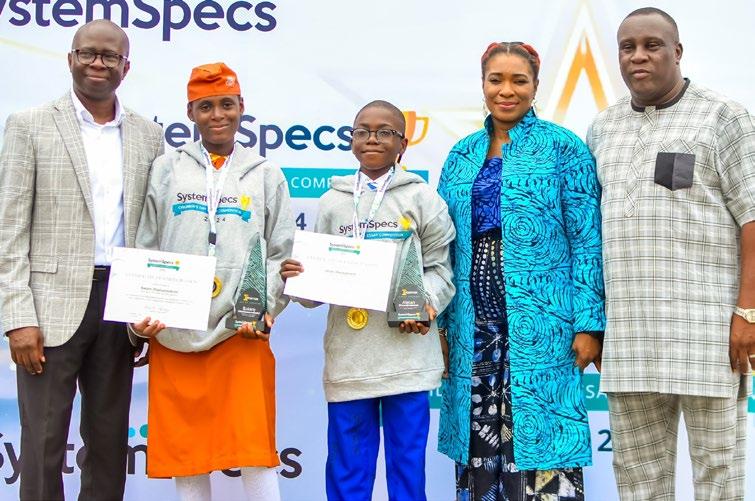

Director, Remita Payment Services Limited, Mr. ‘Deremi Atanda; Ijaiye Ojokoro Senior College, Lagos State, Winner, Senior School Category, Bakare Oluwasubomi; Apostolic Faith Secondary School, Ibadan, Oyo State, Winner, Junior School Category, Aletan Oluwajuwonlo; MD, HumanManager Limited Ms. Adekunbi Ademiluyi and MD, SystemSpecs Technology Services Limited, Mr. Demola Igbalajobi, at the 5th SystemSpecs Children's Day Essay Competition National Awards
in Lagos, on June 14, 2024.


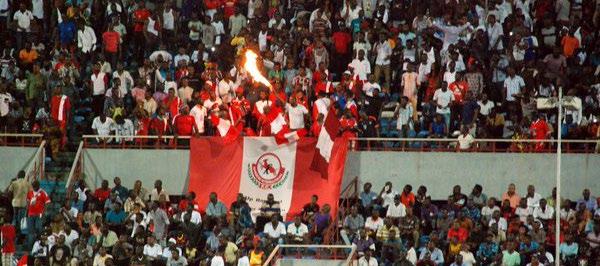
EnuguRangers'triumphantascenttothesummitofNigerian football in the 2023/2024 season marks a remarkable resurrection for one of the country's most storied football clubs. Under the astute guidance of Fidelis Ilechukwu, the Flying Antelopes secured their eighth Nigeria Premier Football
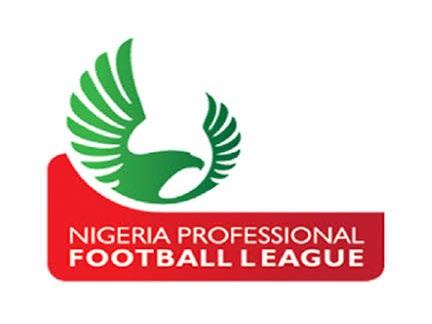
The Enugu fans, known for their unwavering passion and loyalty, played a crucial role in Rangers' renaissance
capping a dramatic turnaround from near-relegation just a year prior. This championship not only cements Rangers' status among Nigeria's elite football institutions but also heralds the dawn of a new era for the club and its passionate supporters.
The journey from survival to supremacy is a testament to the transformative power of strategic leadership and unwavering determination. Just 12 months ago, Rangers found themselves teetering on the brink of relegation, a predicament that threatened to tarnish their proud record of never having been demoted from the top flight. The fall from grace was swift and unexpected, with the team forced to play their home games in Awka due to renovation works at the Nnamdi Azikiwe Stadium. This displacement, coupled with injuries to key players and tactical inconsistencies under then-coach Abdul Maikaba, saw the once-dominant Enugu side slip perilously close to the relegation zone.
Enter Fidelis Ilechukwu, a coach with a proven track record of revitalising struggling teams. His appointment signalled a new chapter for Rangers, bringing with it a wave of optimism that swept through the club. Ilechukwu's philosophy was simple yet effective: win every game. This unwavering focus instilled a winning mentality in the squad, replacing the self-doubt that had plagued them the previous season.

The transformation began with a gruelling preseason training regimen that emphasised fitness and tactical discipline. Ilechukwu meticulously analysed their opponents, exploiting weaknesses and implementing strategies to maximise his players' strengths. His approach to team building was holistic, focusing not just on physical conditioning but also on mental fortitude and team cohesion.
Key to Rangers' resurgence was the strategic acquisition of experienced players. The arrivals of Uchenna Ezeala from Shooting Stars, Zulkifilu Rabiu from Lobi Stars, and Odo Chidiebere from a Saudi Arabian club bolstered the squad's quality and depth. These seasoned professionals complemented the existing talent pool, creating a perfect blend of experience and youthful exuberance.


The Enugu fans, known for their unwavering passion and loyalty, played a crucial role in Rangers' renaissance. The Nnamdi Azikiwe Stadium, once again the team's home ground, became a fortress. A sea of red and black scarves created an electric atmosphere that consistently propelled the team forward. The iconic Rangers anthem echoed through the stands, serving as a constant source of motivation for the players.
Ilechukwu's tactical flexibility was evident throughout the season. He seamlessly alternated between a compact 4-4-2 formation and a more fluid 3-5-2 system, adapting to the strengths and weaknesses of each opponent. This tactical versatility made Rangers unpredictable and difficult to break down, contributing significantly to their success.
The team's defensive solidity became their foundation for success.
Conceding the fewest goals in the league behind only Bendel Insurance, Rangers proved extremely difficult to break down. This defensive prowess was complemented by a potent counterattacking strategy that capitalised on the speed of their wingers and the creativity of their midfielders.
As the season progressed, Rangers' confidence grew with each victory. A 10-game unbeaten run saw them defeat title contenders and relegation-threatened teams alike, propelling them to the top of the league table from 5th at the half-way point. The team's ability to grind out results in tough away fixtures and dominate at home demonstrated their mental fortitude and tactical superiority.
The appointment of 34-year-old Amobi Ezeaku as CEO in August 2023 also played a significant role in Rangers' success. Ezeaku, who served as team manager during the 2016 title win, brought valuable experience and a strategic vision to the club. He implemented a data-driven approach to recruitment, identifying young talent with high potential. Additionally, Ezeaku oversaw significant investment in the club's infrastructure, including the refurbishment of the Academy and training facilities.
Crucially, Ezeaku's leadership extended beyond the pitch. His focus on community engagement and accessibility ensured that the club remained connected to its fanbase. "This club belongs to the people," Ezeaku stated in a recent interview. "Our ticket
